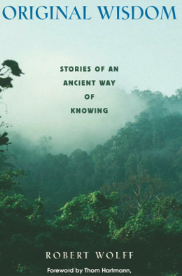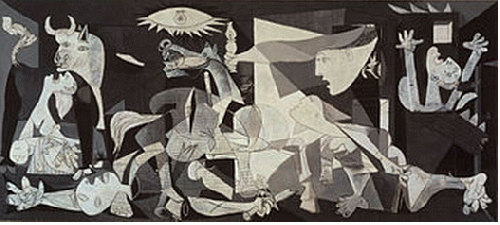Guernica, by Pablo Picasso, from wikipedia
After super-hurricane Sandy a lot more people have come to accept that climate change is here. We have known of global warming, which manifests now as climate change, for 40 years or more. We have known what causes global warming. Very simple: we, humans, burn oil and coal and now natural gas to generate electricity. We burn oil in our cars, in airplanes, in many factories. Burning anything makes smoke and other gases that go into that thin layer of air we call the atmosphere. We burn an awful lot of oil and coal and so produce tons of gases that go into the atmosphere. We have known for a long time that all these gases accumulate high up in the atmosphere and it so happens that many of our waste gases have come to act as a sort of shield around the planet. Our sun sends light and heat to our earth. Before we so generously fed our waste into the atmosphere (and the waters of the earth, and its soil) much of the heat was reflected back into space. Now that shield of gases lets the heat in but prevents much of it from being mirrored back into space. The glaring white of ice and snow at the poles reflects sunlight and heat. When ice and snow melt there is water. Water is dark, it absorbs heat.
For many thousands of years the temperature of the earth fluctuated, but within a narrow range of temperatures. During that time of relatively stable temperatures we, humans, developed our ways of living.
For many centuries we slowly multiplied, settled all over the world. We formed a civilization, many civilizations. We invented things that made life easier, certainly different from our beginnings. A few hundred years ago we invented the steam engine, and then other engines all run by heat: we burned first wood, then coal, then oil. All these inventions changed the way we live. Now we are so accustomed to have the use of electricity that we cannot imagine living without.
But now because fewer of the sun's rays are mirrored back into space our atmosphere is getting warmer. Air of course moves around the world and so it is getting warmer everywhere. The warmer air melts more of the polar ice and the ice of glaciers each summer. The more ice is melted the more water is at the poles. White snow reflects, black water absorbs heat. That is called a positive feedback loop. Small causes can bring big consequences.
Weather scientists long ago calculated that a warmer planet would have more droughts, which means less food can be grown on a parched earh. Warm air can hold more water and so we expect floods and very wet storms. The reason for the enormous floods in Pakistan and Australia a little while ago. And all this change also brings unusual and stronger storms than we are used to. Super-hurricane Sandy was such an unusual and extremely destructive storm.
Almost everyone everywhere has observed changes. Plants and birds are migrating north (in the northern hemisphere) toward cooler places where they never were before. And yet, maybe half of all Americans deny that anything is strange and new. Unfortunately that blocks any effort to do something about climate change which will affect and is already affecting many of the poorest people here as well as the poorest countries of the world.
We know, and have known for a long time, what we could and should do to perhaps slow down global warming. Easily said not easily done: stop burning oil and coal (and now natural gas); stop producing super polluting gases from factories, from planes, from ships, from cars.
Some countries have done that. It is possible to do. We, the US, are one of the two most polluting nations on earth. We are and have been responsible for one fourth, 25%, of all the poisons added to the atmosphere by the entire world; and we are only 4% of the seven billion humans on the planet.. For years I have wracked my brain trying to understand why we did not become a leader in introducing, using, sustainable ways of producing electricity. We know how; why don't we?
A few days ago I had a series of insights. Now I understand why America cannot change its ways. Oh, I am certain that the leadership, the rich, the big corporations, even the oil and coal companies, know perfectly well what they are doing and what the consequences are of what they are doing. But they cannot change. Now, finally, I know why.I'll try to explain but to explain I must tell a story. I'll make it as short as I can, cutting out all the details that make it true.
I am old; I lived through World War Two in the Netherlands. I was 18 when the Germans invaded and occupied Holland. Twenty-three when the war officially ended. For Americans WWII lasted three years; for us the occupation by Germany lasted almost exactly five years. From early May 1940 to early May 1945. The occupation was brutal. I resisted long before there was an organized Resistance. Eventually of course absorbed into the Resistance.
The United States landed an army on a beach in France in 1944, liberated Paris and managed to push the Germans back north almost to the Netherlands but not quite. Most of Holland was still under German control. The Germans plundered Holland that last year. They moved what they could to Germany. Everything that was still in stores was taken. The entire harvest of all farmers in the western and northern provinces of Holland was taken. The copper wires of trains and street cars, the rails, even the trains were moved to Germany. That winter is now known as the Hunger Winter. We had no electricity, phones very occasionally, no gasoline, no candles, no clothes, no food. I survived on a diet of sugar beets and tulip bulbs; I weighted 90 pounds at the end of the war; we were all skeletons.
When I became part of the Resistance I had been taught to shoot, take apart and put together, rifles and automatic weapons. I knew one man above me, and four below me. Everything had to be done in the greatest secrecy. I never slept in the same house more than two nights. Before going to sleep I memorized where my shoes were, my wallet, my coat, the escape--so that I could get out of there in less than a minute, leaving no sign that anyone had been there. The man above me regularly gave me assignments. They were all dangerous of course. I will mention only one.
(Note: You can view every article as one long page if you sign up as an Advocate Member, or higher).






